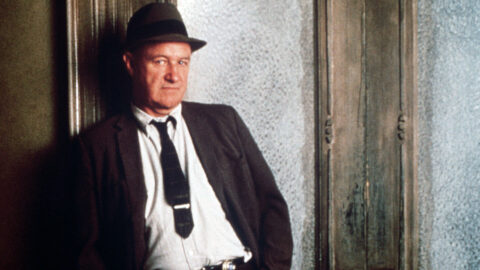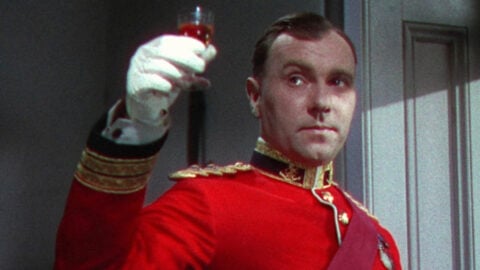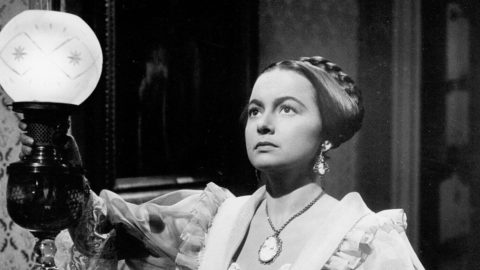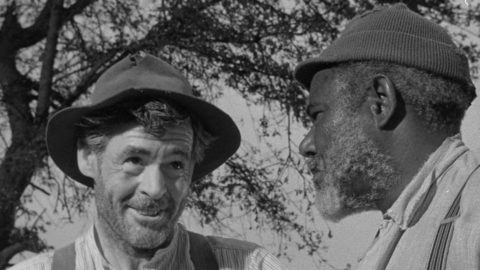TCM Diary: Gene Hackman
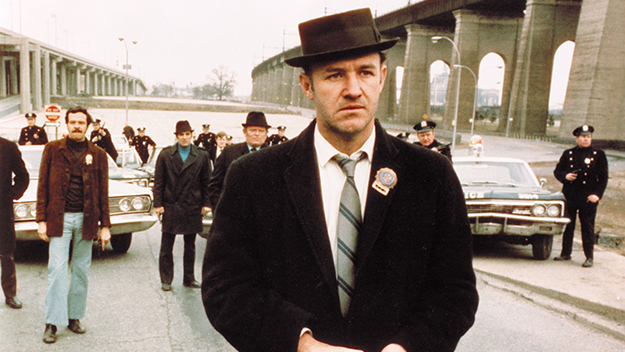
The French Connection
Fifteen years before achieving bona fide, Oscar-minted stardom as The French Connection’s hard-nosed Popeye Doyle, Gene Hackman and classmate Dustin Hoffman were voted “Least Likely to Succeed” by the Pasadena Playhouse. Flunking out with the lowest grade ever conferred by the faculty, Hackman decamped to New York to prove his detractors wrong, sharing apartments with Hoffman and Robert Duvall and working as a furniture mover and ladies’ shoe salesman. One of his former teachers caught him toiling as a doorman at Howard Johnson’s and reaffirmed that he’d never amount to anything, making him feel “one inch tall.”
If this is hard to fathom, consider that Hackman, a burly ex-Marine with a high forehead (and in his own words a “big lummox kind of person”), was entering an industry that prized the sculpted Adonises he called “walking surfboards.” What’s more, he lacked Hoffman’s compelling eccentricity, Pacino’s fevered intensity, De Niro’s endless mutability, and Nicholson’s prurient charisma. What he had—linking arms with the middle age that came somewhat prematurely, though it’s worth noting that he’s roughly a decade older than all the aforesaid “contemporaries”—was steadfast conviction behind every line and gesture. It’s difficult to imagine, let alone recall, an inauthentic moment from Hackman—a reading that isn’t at once perfectly judged and erupting with surprise. Paired with an antithesis of vanity, Hackman was a star both of and outside his time.
Though he’d played bit parts in movies and on TV shows like The Defenders and Route 66, Hackman was nearly 40 when he first attracted attention as Warren Beatty’s ebullient older brother in Bonnie and Clyde. Suddenly directors were fighting for the overnight character star, hoping he would class up their second and third leads with his understated genuineness. Within two years he was playing an ill-fated astronaut in John Sturges’s Marooned, an Olympic ski team coach in Michael Ritchie’s Downhill Racer, and, of particular interest, an aerial stunt performer in John Frankenheimer’s The Gypsy Moths (all 1969).
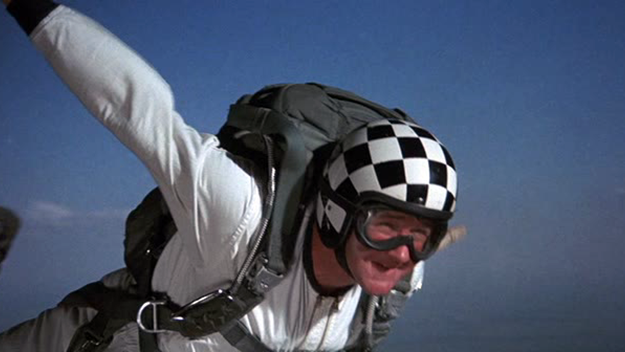
The Gypsy Moths
Hackman’s Joe Browdy in The Gypsy Moths is one of three skydivers barnstorming across the Midwest, together with Zen-like Mike (Burt Lancaster) and impressionable Malcolm (Scott Wilson). The gregarious Joe promotes their shows and devises most of the gimmicks, but demurs from the truly dangerous stunts, claiming the secret of his success is knowing his limitations. As the July Fourth weekend expo approaches, Frankenheimer creates an unexpectedly tender mosaic of heartland values and disappointments. The trio lodge with Malcolm’s estranged uncle and aunt (William Windom and a poignant Deborah Kerr), and their presence precipitates a credible small-town longing to escape staid routines and, like the title insects, hover close to danger.
Chomping cigars, keeping up a steady line of corny jokes and good cheer that barely conceals a huckster’s desperation, Hackman (not yet billed above the title) crafts the most intriguing character in the piece. Joe attends church every Sunday, no matter where his travels take him (though he’s in no hurry to admit it), yet when he visits a strip club on Saturday night, there’s a sad semblance of routine to his come-ons to a dancer (Sheree North) who’d candidly rather be with Mike—it’s the rare movie coupling with no significance, even to them. Other Saturday nights will bring new towns, new clubs, and always the same repentance Sunday morning (“I’m not worthy,” Joe is heard to say in church).
At this phase of his career, Lancaster was specializing in taciturn men, driven, like homegrown Samurai, to ends that defy understanding (see also The Swimmer). His fatalism and twenty-yard stare dovetail perfectly with Hackman’s sweat-drenched charm offensive. Both appear to be straddling two worlds—for Mike, this alleviates any responsibility or obligation except to himself; for Joe, who almost went to college but “it didn’t work out,” it consigns him to never quite belonging anywhere, to setting up elaborate exploits for others to consummate.
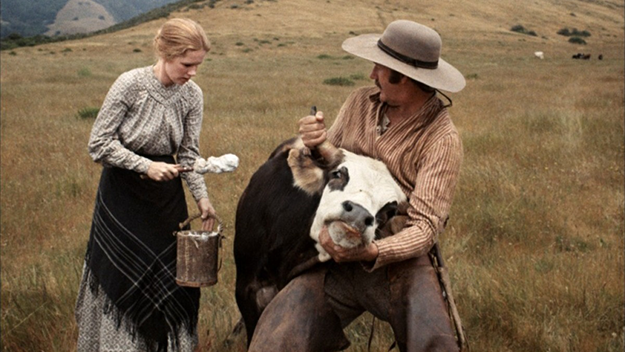
Zandy’s Bride
Without reducing small towns to the “flyover country” contempt with which Hollywood tends to regard them, Frankenheimer captures the feeling of life in slow motion, where a stunt show is so exciting that literally everyone turns out and word of mouth is enough to afford celebrity treatment to the participants. Hackman’s Joe is the most expansive on what drives them to take outrageous risks for scant reward; he delivers a chill-inducing whispered monologue about a particular stunt’s capacity for convincing the diver he’s invincible, seducing him into not pulling the ripcord in time, while suggesting with almost imperceptible subtlety that the diver may be grappling with a death wish.
He also reveals a truly nasty side when anyone’s ideals or insecurities threaten to impinge on his management. This points to another singularity in Hackman: he can play a thoroughgoing bastard with no redeeming traits except perhaps unassailable belief in his goals and methods. Popeye Doyle, lest we forget, was a violent racist with no time for due process; his rancher in Jan Troell’s Zandy’s Bride (1974)—an ambitious film undone by its lack of character continuity—commits an act of marital rape that’s never atoned for and only partly explained in his visit to his father, suggesting we’re fated to inherit the worst traits of our progenitors.
The same thesis courses through Gilbert Cates’s I Never Sang for My Father (1970), Hackman’s final film before his career took off and the best Gene Hackman movie you’ve never seen. Adapted by Robert Anderson from his autobiographical play, the film details the fraught relationship between iron-willed 80-year-old Tom Garrison (screen legend Melvyn Douglas) and his guilt-racked middle-aged son, Gene (Hackman), first pictured together in a stilted black-and-white photograph. In his day Tom was the town mayor and president of the board of education; now his achievements are the stuff of bronze plaques no one reads. “A forgotten man in an ungrateful city,” is how Gene characterizes him, understanding that vital force to nuisance is a journey we all must make, and expending every emotional resource in his filial devotion.
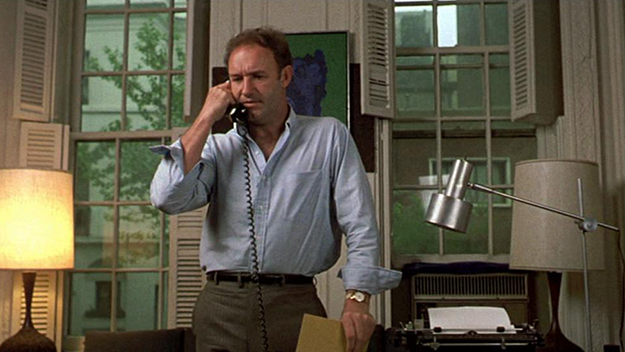
I Never Sang for My Father
With the death of his wife, Tom’s dependency escalates. Gene has never been able to voice contrary opinions to Tom; as embittered sister Alice (Estelle Parsons) observes, she’s always done the shouting while Gene runs to be sick. A successful writer and himself a widower, Gene would like to move to California and marry his secret fiancée, but can’t bring himself to sever familial ties. For Alice, they were cut by Tom himself when she chose to marry outside their faith; now she is grateful for his scorn because it prepared her for the harshness of the outside world. Gene has no such autonomy—no one was ever better than Hackman at conveying the deep and resounding hurt of cumulative slights (Tom giving him directions to his childhood home), or finding patches of contentment in an emasculated, stoop-shouldered life (watching his mother in the garden through a window).
Douglas, playing an even more aloof patriarch than he’d essayed in Hud, has the more colorful role—Hackman raises his voice only twice, and when he does it’s both fearsome and cathartic—but both men invest volumes of emotion in every charged word. This is not Daddy Dearest, but a portrait of deep, inexpressible love, and the often unbridgeable gulf between parents with expectations and children with dreams. Hackman’s nomination for Best Supporting Actor was evidently a nod to Douglas’s seniority and his still-new-on-the-scene status. But he’s the broken heart of this shattering movie, etching a bone-deep study of irrecoverable shame and paralyzing anxiety.
“Death ends a life, but it does not end a relationship,” his voiceover tells us at the start of the film and repeats at the close. Hackman’s performances take on a similar quality of permanence. Whether commanding or forlorn, dauntless or downcast, Hackman is the cinema’s barometer of hangdog honesty. His characters haunt you like a memory enshrined forever in a family album.
The Gypsy Moths airs September 2, and I Never Sang for My Father on September 23, in addition to other movies featuring Gene Hackman, Turner Classic Movies’ star of the month.
Steven Mears received his MA in film from Columbia University, where he wrote a thesis on depictions of old age in American cinema.



